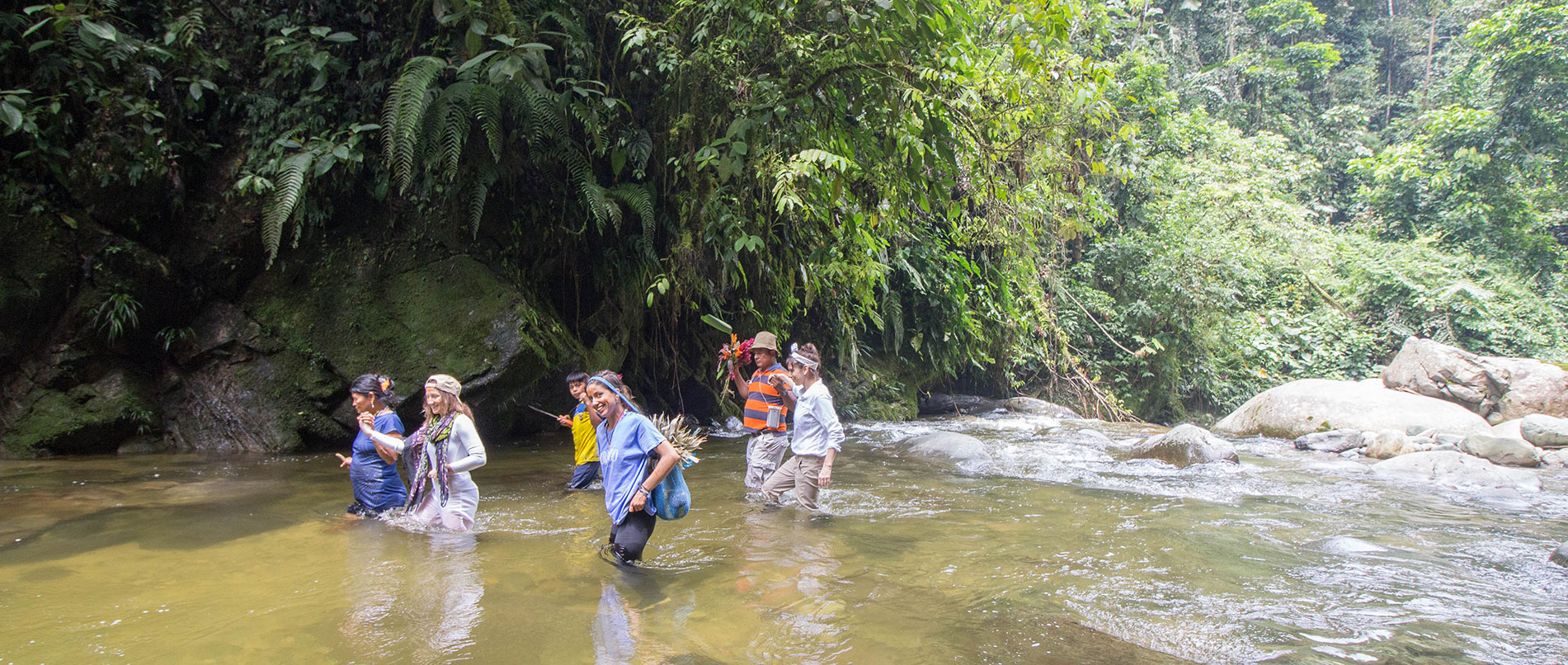We offer a unique and transformative opportunity for you to immerse yourself in the vibrant culture and rich biodiversity of the Ecuadorian Amazon.
This program is designed to provide you with an in-depth understanding of the importance of medicinal plants in traditional medicine and their role in addressing local epidemiological concerns. You will work alongside alternative healthcare providers, specialists, and local healers, learning about their customs and the significance of their work in the preservation of their culture.
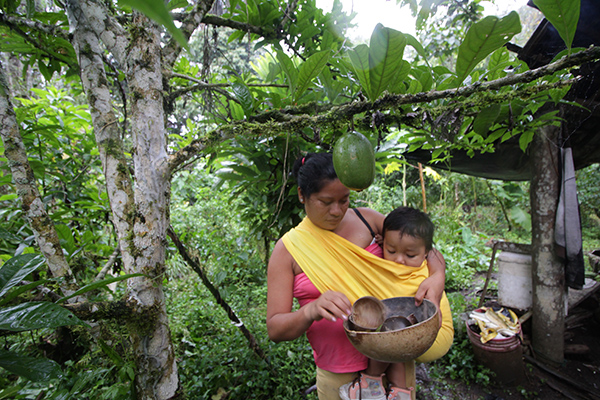
Step into a world where ancient healing wisdom meets vibrant biodiversity. This transformative internship invites you to explore the deep-rooted practices of Amazonian ethnobotany and traditional medicine through hands-on experience and cultural immersion.
Working side by side with alternative healthcare providers, local healers, and plant specialists, you’ll gain a profound understanding of how the Kichwa, Shuar, and mestizo communities use medicinal plants to address local health concerns and preserve their cultural heritage.
What You’ll Experience:
-
Learn Traditional Plant-Based Healing
Study the medicinal plants used by the Kichwa people and explore how local epidemiological concerns shape community pharmacopoeias. -
Support Community-Led Health Projects
Contribute to cultivation efforts, plant inventories, and agroforestry work that empowers local medicine men and women. -
Engage in Ethnobotanical Research
Discover the factors that influence how knowledge of plant medicine is passed down across generations in indigenous communities. -
Live with Host Families
Experience full cultural immersion by staying with local families, where you’ll build lasting relationships and gain firsthand insight into daily Amazonian lif
The Experience
A Typical Day:
Morning:
Start your day with guayusa tea and conversation, then head to an agroforestry farm to learn about and work with medicinal plants.Afternoon:
Participate in guided sessions with local healers, conduct plant inventories, or engage in independent research.Evening:
Enjoy meals and downtime with your host family or take part in community activities such as sports, language exchange, or cultural celebrations.Weekends:
Explore the surrounding rainforest, visit nearby attractions, or spend more time engaging with your host community.
Program Highlights:
In-depth exposure to Amazonian ethnobotany and traditional medicine
Hands-on work in agroforestry farms and medicinal plant gardens
Collaboration with indigenous healers and local health practitioners
Cultural immersion through homestays in indigenous communities
A unique opportunity to support sustainable practices and cultural preservation
This placement goes beyond professional development—it’s a journey of cultural discovery, ecological understanding, and personal transformation. You’ll return with practical skills, meaningful memories, and a deeper appreciation for the profound connections between health, culture, and the environment.
Logistics
To begin journey you will need to fly into Mariscal Sucre International Airport (UIO) in Quito, Ecuador’s capital. We will arrange transport to the local town of Tena, which is approximately 4 hours drive.
You will stay with a carefully selected Host family, and be provided with a comfortable private room. We can also arrange for a local hotel if you prefer.
The cost of the programme is £1000 per week, with a minimum 2 week booking (including travel time).
This includes;
- Private Accommodation
- All meals
- Airport Pickup & transfer to project (includes overnight stay in Quito up-on arrival)
- All project-related activities
- Premium Support Package with 24/7 Support
This does not include;
- Flights
- Visas (if applicable)
- Vaccinations
- Travel Insurance
- Personal spending and any extra activities
Testimonials
All of these experiences include people. People are what kept and keep me going. The energy of the Ecuadorian Amazon was like no other, and I struggle with the fact that I had to leave a place that brought me so much joy. It doesn’t take money, a big house, a busy schedule, or a fit body to be happy there. All you need is an open heart, a wide smile, and a willingness to laugh at yourself to feel like you belong in the local culture which is full of life. After four months of being in Ecuador, I became part of an extensive family that I know I will return to and I gained a plethora of new skills to use. Having already traveled to four continents and over 20 countries, where I grew up in Chicago, Illinois, and where I spent my time in San Pablo/Tena, Ecuador are two places I can genuinely consider I have family.
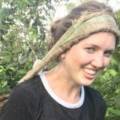
Elizabeth
Day 6
The kichwa host family and I were out the door and trekking up to the chakra-farm at seven in the morning to prepare for a traditional amazon dinner booked at the restaurant. We all carried a load of cooking equipment or fresh local amazon produce in large baskets slung over our back and secured with a rope handle resting on our heads. Dona Elena and I started food prep and equipment cleaning. While food prep was going Don Clemente started two open fires under a bamboo shelter and had water boiling straight away. By noon the kitchen was running like a well-oiled machine with more family members coming in to assist with food harvest from the chakra, food prep of over twenty different foods, tending the fires, and dining room preparation. The thirty restaurant customers arrived at sunset and started with a tour of the farm before digging into a magnificent amazon feast.
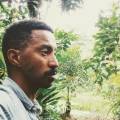
Petros
As a biochemical engineering major, I learn a lot about western medicine and how to modify things on the DNA level. Traditional medicine and this field are not 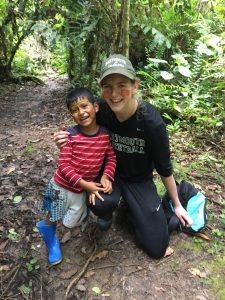 always combined as they could be. I can see there being some potential with bringing the knowledge I have learned from the Amazonian plants to the world of the laboratories. Additionally being introduced to plants in the Amazon has opened up a new field of study for me that I may pursue.
always combined as they could be. I can see there being some potential with bringing the knowledge I have learned from the Amazonian plants to the world of the laboratories. Additionally being introduced to plants in the Amazon has opened up a new field of study for me that I may pursue.
Putting into words how this experience benefitted me educationally and for my potential career is extremely difficult, because this experience definitely has changed my life. Tangibly, this experience taught me so much about traditional medicine and medicinal plants. As a biochemical engineering major, I mainly see how medicine is made in labs, and it was awesome to see how medicine is directly taken from nature and used. I could see the collaboration of the traditional and western medicine being a potential project for my future.
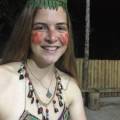
Emily
For 9 weeks I participated in an agroforestry internship through Global Nomadic. This opened me up to a company that produces and sells an energy drink made from guayusa, a ‘tea’ like leaf native to the Ecuadorian Amazon. I worked for the Fundacion, the non-profit initially attached before total separation in the Summertime. The vision of the Fundacion is to improve local livelihoods and conserve tropical biodiversity by creating sustainable value for rainforest products.
Throughout my agroforestry placement I undertook a variety of different roles and had the potential to participate in a number more, those of which I did participate in are listed below.
- Creation and editing of monitoring guides.
- Research into the health properties of Amazonian plants.
- Creation and editing of communication products such as posters, handouts and product packaging.
- Organisation of intern work.
- Creation of a guide for future interns.
- Creation and updating of vivero (plant nursery) inventory.
- Reforestation project: rotating agroforestry fund.
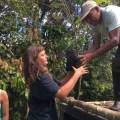
Lizzie
Book a Call
Schedule a free call with us to discuss the project in greater details, and answer any questions you may have.



